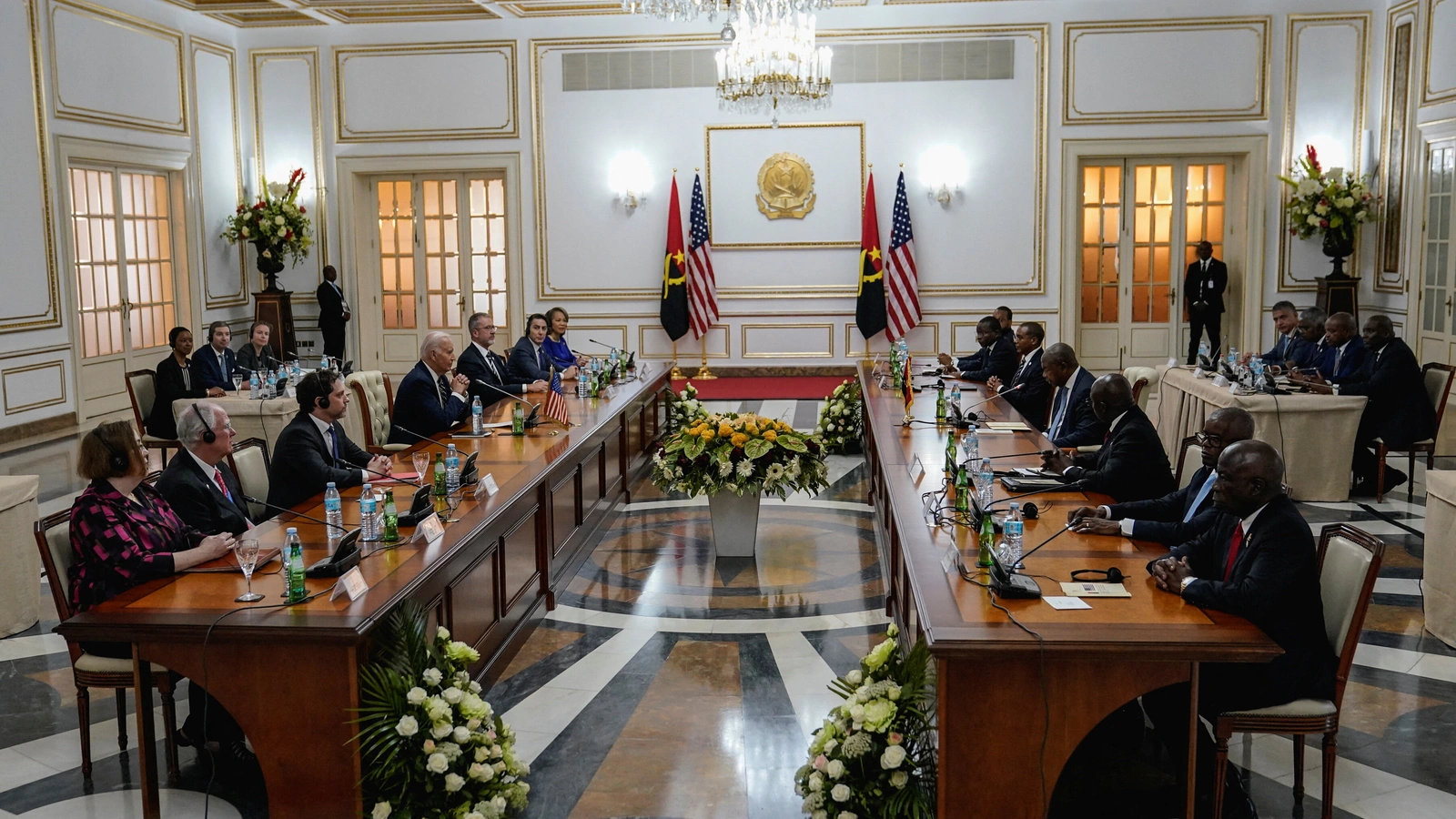News
Why Sub-Saharan Africa Matters for U.S. Economic and National Security
Building relationships with the region, rather than transactional neocolonialism, is the best route for strengthening the United States’ critical mineral supply chains.

At the center of President Donald Trump’s vision for the United States is a new Golden Age characterized by greater inflows of investment, increased domestic production and job creation (read Trump’s Made in America agenda for greater detail), and economic self-sufficiency. The larger goal is a United States that can chart a course in which it puts itself first and calls all the shots. But America First as a governing ethos raises a series of concerns, one of which is the future of the country’s economic and national security.
The United States may be the land of plenty, but even the staunchest of patriots will concede that the country has limited stores of critical minerals—the fifty commodities identified by the U.S. Geological Survey (USGS) that are deemed vital to the economy and U.S. national security. Those commodities range from cobalt and lithium to lesser-known materials including dysprosium and yttrium, all of which are used across a host of production verticals from aerospace and defense to healthcare.
Trump is aware of the importance that critical minerals have in his vision for an American renaissance. His desire for Greenland to become part of the United States has more to do with accessing the island’s untapped mineral supplies than it does with welcoming 57,000 new U.S. citizens. Likewise, his plan for bringing an end to the ongoing war in Ukraine is underpinned by a mineral deal that would see the United States access Ukraine’s critical mineral reserves.
Herein lies a major weakness for the United States: it relies on importing many of those critical minerals. A 2024 review by the USGS found the country to be wholly reliant on imports for twelve of the fifty critical minerals and more than 50 percent reliant on an additional twenty-nine. Among those critical mineral trade partners are Australia, Canada, and Chile. China, too, is a major player in the global critical mineral supply chain: the country produces 99 percent of battery-grade graphite, more than 60 percent of lithium chemical, and 70 percent of refined cobalt, according to the International Energy Agency.
As such, the United States finds itself in a precarious position whereby its ability to import the materials vital for its economy and defense industries is controlled by foreign actors, some of whom benefit from its vulnerability. China exerted its dominance when, in December 2024, it implemented a ban on the export of gallium, germanium, and antimony—all boasting multiple military applications—to the United States. Indeed, the number of global export restrictions aimed at critical minerals has increased fivefold from 2009 to 2022, according to the Organization for Economic Cooperation and Development.
This is why the United States will need to focus more on sub-Saharan Africa. While China is blessed with its critical mineral reserves, it imports vast quantities from sub-Saharan Africa, a region that boasts 30 percent of the world’s proven critical mineral reserves. This has been made possible due to years of investment in developing an intricate series of supply-chain networks as part of the Belt and Road Initiative. In the Democratic Republic of Congo (DRC), for example, a country endowed with 68 percent of the world’s known cobalt reserves, Chinese companies are said to have a controlling presence in as much as 80 percent of the nation’s critical mineral supply chains.
It is no secret that the United States has been a laggard on this front and has only lately realized the importance that sub-Saharan Africa will play in global supply chains. Under the Joe Biden administration, the United States committed a combined $4 billion to the Lobito Corridor—the eight hundred–mile rail network snaking through Zambia, the DRC, and ending at the port of Lobito on Angola’s Atlantic seaboard. The completed infrastructure project aims to provide the United States (and Europe) with greater access to the region’s mineral reserves. The project was of such importance that President Biden’s first and only state visit to sub-Saharan Africa came in December 2024 when he travelled to Angola, making him the first U.S. president to visit the country which was a staunch ally of the Soviet Union during the Cold War.
The test for the new Trump administration will be how it chooses to engage the region. Initial decisions that saw the U.S. Agency for International Development (USAID) put on ice do little to suggest that Trump wishes to deepen ties with governments in sub-Saharan Africa. This became further apparent when South Africa’s ambassador to the United States—representing the world’s largest producer of platinum group metals—was declared persona non grata by Secretary of State Marco Rubio.
If the Trump administration does intend to engage with countries around critical minerals, however, then it will likely be transactional. DRC President Felix Tshisekedi has engaged in discussions around a minerals-for-security deal that he appears to be borrowing from the proposed U.S.-Ukraine deal. In theory, it would see Washington provide support to Kinshasa amid its ongoing battle with M23 rebels in the country’s eastern, mineral-rich reaches, and in doing so, pave the way for U.S. companies to do business in the country. The deal could also be seen by some in the DRC as an opportunity to break China’s monopoly over the country’s critical mineral landscape. Such a development has the potential to spark similar engagements, including a larger minerals-for-aid approach, which could see the Trump administration change tack on USAID funding, for example.
But any such engagement cannot overlook the fact that the United States would need to invest heavily across the region, especially in terms of logistics and transport infrastructure. The African Development Bank estimates that only 27 percent of the continent’s roads are paved, while $293 billion is needed for transport infrastructure each year until 2030 if “structural transformation” in Africa is to be fast-tracked. As the Lobito Corridor illustrates, infrastructure projects in Africa—particularly around transport—are significant both in terms of cost and scale.
A solely transactional trade relationship with sub-Saharan Africa is of some concern, however. Such an approach could resemble a neocolonial agenda and deter governments in the region from engaging with the United States. Sub-Saharan countries could instead find more comfort engaging with BRICS nations—the intergovernmental organization comprising ten emerging markets including Brazil, Russia, India, China, and South Africa, along with Egypt, Ethiopia, and the United Arab Emirates—not least because of a shared sense of political alignment and history but also because of a wider structural shift in global affairs.

For the United States, securing certain trade arrangements could also see it compromise on some of the values it has historically championed in its dealings with trade partners, namely: good governance, human rights, and the promotion of free and open societies. A minerals-for-security deal with the DRC, for example, could worsen the ongoing conflagration, causing greater human suffering and displacement within an already-fragile region.
During his joint address to Congress, Trump announced that he would “dramatically expand production of critical minerals and rare earths here in the USA.” This would entail increased extraction and processing of the United States’ mineral reserves, perhaps also establishing new mines. But the United States has a finite amount of critical mineral reserves and opening new mines can be a decades-long endeavour.
For the United States to ensure economic and national security through improved critical mineral supply chains, it will need to look further afield, and sub-Saharan Africa will be an essential partner in this process. But the United States should be careful about pursuing hard-nosed and transactional deals with counterparts in the region; it will find more value in working with governments rather than viewing them as subjects within a grand strategy.
America First does not have to result in America Alone, and it does not need to come at the cost of American values or the wellbeing, dignity, and security of African societies.
This article originally appeared on the Council on Foreign Relations


